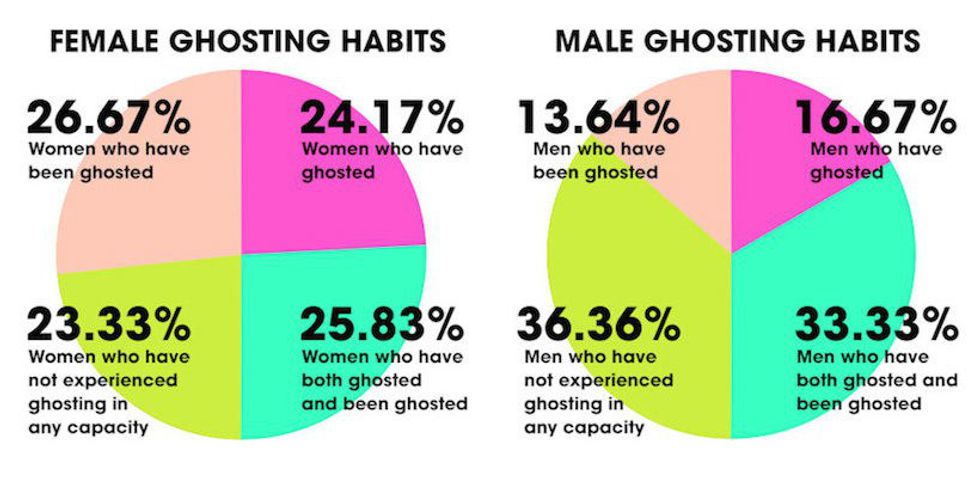I'm perpetually single and I have come to be completely fine with it. I can wake up at noon, sprint out of bed at 6 a.m. or sweat it out at 5 p.m. at a hot yoga class without explaining myself to anyone, except maybe shooting my mom a text or two (she always thinks I'm on the verge of dying if I don't answer). However, living in New York City, you're bound to run into someone, go on a few dates and experience what has come of dating culture in 2016 with young adults. To sum it up: It's awful.
And the main problem lies in the fact that people aren't honest. It's trendy not to care. It's "in" to be aloof and simply not have the energy to keep track of your feelings for another person. You're expected to carelessly, without a single thought, exchange saliva with another person, but you are deemed crazy for then asking what is this relationship.
It's backwards, it makes my head hurt, and it makes me scared to put myself out there; even more scared than being alone.
Above all, ghosting is a real thing.
While ghosting really sucks, apparently it's really common and you've probably been ghosted before.
"Even though the silence probably left you at best confused, and at worst, diving into your deepest insecurities for answers, an Elle.com survey found that you’ve also likely been the ghost yourself at some point. The survey shows that 26 percent of women and 33 percent of men have both ghosted and been ghosted, while 24 percent of women and 17 percent of men admit to ghosting (but not being ghosted on)."
College students and young professionals alike know the drill. Lizzie Bartone, 23, has been on both sides of the ghosting situation.
"I think that on the receiving end it's really annoying and can sometimes be really painful depending on how much you were feeling the person," said Bartone. "But when you actually have to ghost someone, when you have to do it to someone that just isn't getting the hint, it can be really rough. I felt so guilty afterwards. I know for some people it's easier, but I felt bad about it for a while. That was until I ran into him at a bar a month later and he made me feel really bad and reminded me why I didn't like him in the first place."
Even at 24, Sara Heller has also been on both ends: receiving and initiating.
"I've been on both sides of ghosting: the ghosted and the ghoster. If I ghost a guy, it's because he seemed to be clingy, more into me than I was him, or just in it for the sex. It was easier to go silent on them then to do the right thing and try to put into words that it just wasn't working out. But I've been on the other side as well, and being ghosted can be painful," said Heller. "Once, I went out with a guy and had a lot of fun. After our date, I texted him to let him know how much I had enjoyed spending time with him, and I never heard back from him. I was hurt and confused; why didn't he text back? Didn't he have as much fun as I did? I both love and hate that ghosting has become a part of today's dating culture.
NYU student, Madison Coe, 20, recalls a guy from her past that still leaves her questioning about what happened.
"He like refused to talk to me, pretended I didn't exist, said it would 'be easier to get over each other if we don't talk.'"
Ghosting avoids conflict and fear of confrontation. Fair enough. But it's actually super annoying to end a relationship like this, unless the feeling is completely mutual.
It also ignites anger in the other person if you end a relationship in avoidance. Put on some real pants, a stern face and just give the other person the decency of knowing or not knowing if there is a future.
But, somehow, we have found a new phenomena that is even worse than ghosting: benching.
"To use a sports metaphor (my first ever), he would be on the roster but not in play; I’d decided to bench him. It’s despicable, manipulative, selfish behavior — and something we’re all doing."
Benching is a way to keep your options open, while still dangling someone along, just in case you are bored and need someone to hang out with. Which, is even more awful than ghosting.
"What’s really going on here," Jason says, "is the person on the other end isn’t really interested in dating you, but doesn’t want to let you go for some pretty selfish reasons. They’re effectively keeping you on the bench like a second-string baseball player in case the starting pitcher bows out. It’s a totally selfish and terrible thing to do, he explains, but what’s worse is that we all do it. There’s a whole bunch of reasons you might bench someone or they might bench you, whether it’s a play for power or a way to feel good about oneself without commitment."
Ghosting and benching are the same psychologically. It's avoiding conflict, the confrontation that you don't want to date someone. It sidesteps the finality of a decision of saying "I'm not interested in you." And with the ever-so-trendy "feelings are stupid" wave that is still crashing onto the beaches of millennials, it makes sense.
Since everyone is not into commitment or exclusivity, benching is perfect. You can bench the players that are relatively poor performers, but just in case something happens in your life where the starters need a break or incur an injury, you have backup.
But the basis is selfishness. It's using someone like a jersey number on a field. You know it's bad when there is a sports analogy going around about it.
Social media, technology and dating apps like Tinder and Bumble ignite the tendencies towards benching and ghosting even more so. You can hide behind a screen and "disappear." But even then, there's still a person with valid feelings and emotions behind that swipe and screen.
As a 20-something-year-old, here's my take: Let's just be honest. Be upfront. Be genuine. Don't bench people. Don't ghost people. Say what needs to be said, even if it's not the best news. Oftentimes the truth is hard to say, but that doesn't mean it shouldn't be said.







 Lumiere figure at the Disney Store at the Ala Moana Shoppi… | Flickr
Lumiere figure at the Disney Store at the Ala Moana Shoppi… | Flickr








 StableDiffusion
StableDiffusion StableDiffusion
StableDiffusion 10. Extra BlanketsJuwenin Home 100% Cotton Knitted Throw Blanket
10. Extra BlanketsJuwenin Home 100% Cotton Knitted Throw Blanket StableDiffusion
StableDiffusion StableDiffusion
StableDiffusion File:Kishlaru familie.jpg - Wikimedia Commons
File:Kishlaru familie.jpg - Wikimedia Commons Photo by Hanna Balan on Unsplash
Photo by Hanna Balan on Unsplash StableDiffusion
StableDiffusion black blue and yellow round illustrationPhoto by
black blue and yellow round illustrationPhoto by 





 woman holding glass jar
Photo by
woman holding glass jar
Photo by 








